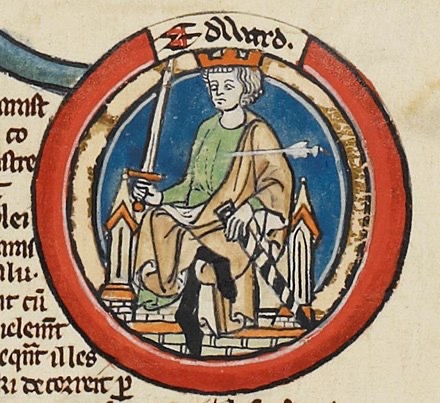Transpositioning

Miniature of Edward the Martyr
in a royal genealogy of the 14th century.
" … the terribly fortunate ones, the benefactors of almost endless Transpositioning."
A Fambly history might best be recognized as a permanent record of that Fambly's Transpositioning, for given broad enough horizons, it will encompass pretty much every possible human condition. Royalty will counterbalance laity, saints stand alongside sinners, and heroes hang with cowards. Deciding what the Fambly story means might well prove daunting, even impossible, because it might and could mean anything, everything, and nothing definitive at all. That history might not intend to mean very much of anything, anyway, but to demonstrate how everything tends to reduce to nothing and nothing to somehow represent anything at all. When I can see through the personalities and dates and shift my focus toward perceiving what none of the stories explicitly states, I might approach a better and higher purpose for telling those stories.
As I concluded a few episodes ago, history represents the most substantial possible evidence that we were each born equal. Whether future king or future not very much of anything, we start with little more than potential. Some will manage to make something considerable of themselves, while others might fall far shorter. Still, each somehow manages to carry forward an evolution probably not evident within their own experience. Only longer cycles show the actual Transpositioning. Even our King Edward THE Martyr, still revered as saintly in The Book of Common Prayer, whom historian Tom Watson concluded, was "an obnoxious teenager who showed no evidence of sanctity or kingly attributes and who should have been barely a footnote." He lived barely sixteen years and might have been killed by thanes loyal to his step-mother in a turn worthy of any of Shakeaspeare's more morose productions, but even in his short years, he played a role in the forward evolution of the role of English king.
His younger half-brother and successor, good old Ethelred THE Unready, would go on to become the first English king to cede some authority to a few of his vassals, a foreshadowing of what would later evolve into a Parliament following the Norman Conquest. Overall, his reign didn't amount to very much of anything, but it fulfilled its place in the longer forward evolution of England. It would seem absurd to presume my existence will turn out to be very much different. What might seem an essentially insignificant life from an extremely up close and personal perspective might later come into a distinctly different focus. I might have accomplished what will be seen as much more influential than I ever felt. I might also essentially get lost in rounding, as Edward THE Martyr almost has. There's no knowing.
I think it ironic that there never could be any knowing. The high and highfalutin among us might eventually be acknowledged as merely pretentious. The high and mighty carry no guarantee of significance. Those who fill today's headlines might prove to be the very least influential once the history of this time gets written and even less significant in light of likely continuing Transpositioning. It seems essential to remember that today's on its way to someplace else and that today's castles will, without doubt, one day crumble. Time will reduce our finest works and greatest treasures to dust. I have a box I have not opened in decades. I long ago labeled it my Cannot Be Undone Box. I placed in it items I considered of particular significance decades ago, long before I'd even found what might have turned out to be my calling. I have not been able to bring myself to open it for over thirty years, for its contents will undoubtedly be just what they were with no ability to change themselves. Their meanings might have shifted in the decades since I placed them there, but their presence strikes me as somehow futile. They will be precisely what they will be. I cannot imagine what they'll mean.
I do my best and try to keep my writing schedule. I believe, for ill or good, that I must maintain my writing schedule, that I will encumber and lessen my existence if I don't place my butt in that chair every day. This might qualify as an obsession, or it might be the only reasonable conviction for anyone fancying themselves a writer. What else can any of us do but engage in our work as if that effort might eventually make a difference? None of us will ever get to determine what sort of a difference our contributions might make. Still, we're called to make our contributions even though they'll most likely translate into some slight Transpositioning influence, if that.
The Romans gave way to the Pagans, who adopted the Roman's Latin and jurisprudence. They later embraced their new religion and became Christian or a variant I might best describe as Pagan Christianity, where armed soldiers went out vanquishing Pagans and Saracens until all of Europe proclaimed itself Christian, whereby they began slaughtering each other over the kind of Christians their brothers had become. They conquered, subjugated, and displaced without recognizing that they were always punishing themselves and their great-grandchildren. The great migrations continued until a few found their Eden at the End of Their Oregon Trail. Those of us who ended up near the End of an Oregon Trail seem to have become the terribly fortunate ones, the benefactors of almost endless Transpositioning. The fine soil we enjoy here might just as well have been concocted from bones.
©2024 by David A. Schmaltz - all rights reserved


